- Home
- Kathy Reichs
Seizure: Page 5
Seizure: Read online
Page 5
To many Bolton students, I was “that girl.” As in, “that girl who broke into Claybourne Manor.” Or “that girl who got Chance arrested.” But I had other titles as well. “The young girl” or “the little kid.” Or my favorite: “the science weirdo.”
From what I could eavesdrop, I was practically a villain. The blue bloods were horrified that a boat kid from Morris had taken down members of their circle.
Stories reached me, burned my ears. Wild tales straying far from the truth. I couldn’t believe some of the rumors. Everyone had an opinion, none complimentary.
Disheartened, I tried to shut out the whispers.
Focus on another sense. Try your nose.
I drew air through my nostrils, careful not to snort. Usually I could ferret a few scents from the breeze. Fresh-cut grass. A cloying perfume. Creed? Sweaty underarms. Melting butter.
Good. Safe, familiar scents.
Then the odors changed. New smells entered my perception. Trace odors, lurking just below the top layer. Undefined and faint, the aromas were difficult to pin down. Yet recognition danced on the tip of my consciousness.
My mind tried to dissect the new olfactory input. Failed. To put it more clearly: my nose stopped making sense.
That sour tang wafting from the red-dressed debutante talking with her boyfriend. Was that … nervousness?
And the dull vinegary smell oozing from the toddler by the koi pond, the one randomly dropping pebbles into the water. If forced to pick a label, I’d go with … boredom.
I couldn’t explain it, but I smelled … something. And my brain was insisting on the connections. I dug deeper.
A door banged open in my brain. Thousands of trace scents poured through.
Dropping to a knee, I grabbed my head with both hands. The torrent of information was more than I could bear. Straining and quivering, I tried to shake off my flare. I had to make it stop.
SNUP.
The power receded. My senses normalized. It was over.
I pulled off my sunglasses and rubbed my eyes, feeling like I’d been through a ringer. When my lids opened, the Tripod of Skank was three feet away.
CRAP CRAP CRAP.
Courtney Holt. Ashley Bodford. Madison Dunkle.
Three spoiled brats playing at princess. My personal nightmare.
They didn’t like me, and I loathed them. These girls were the last people on earth I wanted to see.
“What are you doing here?” Courtney seemed genuinely astonished. Which, with her intellect, was routine. “Surely you can’t debut now? Not after what you did to Hannah.”
“After what I did?” I spoke without thought. “To her? Seriously?”
Courtney nodded, wide-eyed, blonde curls bouncing. Her microscopic blue dress struggled hard to cover a perfect figure. Sapphire jewelry sparkled in the afternoon sunshine.
“You’re a criminal,” she said, dead serious. “You make people go crazy!”
The Tripod stood shoulder to shoulder before me. I felt trapped.
“I don’t know how you stayed active.” Ashley brushed glossy black hair from her eyes. “But what I can’t get is why. No one wants you here. You must know that.”
Okay. That hurt.
Madison giggled. She was the nastiest—the Tripod’s front foot. Hair, nails, and makeup flawless, she practically glowed with expensive excess.
Madison also had a crush on Jason. His fascination with me did not go over well.
Where was he? I could’ve used his attention right then.
“The word’s out, Tory,” Madison said cruelly. “Everyone knows you’re a freak. Whose house do you plan to rob next?”
Enough. Three against one, and they weren’t pulling punches. Time to retreat.
To my left was a clubhouse door. I strode over and tried to shoulder it open. It didn’t budge.
Laughter erupted behind me.
“Try pulling, sweetie.” Madison.
“And don’t muss your rented clothing,” Ashley added.
“That is a nice dress,” Courtney said, oblivious as always. “I wonder how she got it? Is there, like, a Goodwill thing for debs or something?”
Our face-off had begun to draw a crowd. I hated the attention.
Madison, however, relished an audience. She moved in for the kill.
“Maybe you should find another activity, Tory.” Chilly smile. “One more suited for someone like you.”
Ashley and Courtney nodded.
Humiliated, I yanked the door open and fled inside.
“So long!” Madison called. “We’ll be here all season!”
Spiteful giggles followed me into the air-conditioned darkness.
THE DOORS BANGED shut behind me.
I sped down a red-carpeted hall, past trophy cases, model ships, and massive murals depicting ancient ocean voyages.
The setting barely registered. My emotions were on tilt.
Get away. Get calm.
The cowardly mantra kept looping inside my head.
Get away. Get calm.
Eventually the hallway dumped me into a lavish dining hall. A gigantic mahogany table occupied the center of the room, surrounded by chairs adorned with embroidered cushions. On the far wall, sunlight poured through huge windows overlooking the harbor. The air reeked of wood polish and fresh linen.
The grandeur of the chamber stopped me in my tracks.
“Swank.” The empty room swallowed my whispered comment.
Hands on hips, I breathed deep, trying to regroup mentally. Slowly, my shaking legs steadied.
I considered my options. Return to the party? No chance. I was done with awkward circling for the day.
Bail? Sure, but how? My ride wasn’t due for an hour.
As I dithered, undecided, a painting caught my eye. Bold and colorful, it stood out from all others decorating the walls.
I stepped closer for a better look.
Oil on canvas. Cedar frame. Old, more weathered than the surrounding paintings, but somehow more vibrant as well. All blues and reds and splashes of yellow. Eye-catching, but clearly not a masterpiece.
Unlike the dour males staring down around me, the subject of this portrait was a woman—a lady swashbuckler dressed in men’s clothing. She stood on the deck of a ship at sea, auburn hair streaming, a pistol in one hand and a dagger in the other.
Captivated, I tried to make out the vessel’s name. No go. I checked the portrait’s curved wooden frame for a nameplate, title, artist, anything.
“Admiring young Bonny, eh?”
I started at the voice. Turned.
A man dressed in a butler’s uniform stood behind me. He was wearing black pants and a white shirt, coat, and vest. A ridiculous white bowtie topped off the outfit. He’d entered so silently I hadn’t heard a sound. Weird.
“You have a good eye.” The man drew close, nodding toward the painting. I guessed his age at somewhere north of seventy. He had a full head of white hair and thick, bushy eyebrows. My mind sent up an image of Colonel Sanders.
Bushy Brows smiled, eyes locked on the canvas. “It’s not the priciest picture in the collection, but it has the most character.” He clenched a fist for emphasis.
I stared, at a loss for words. The old coot seemed to have sprung straight from the carpet.
“Sorry, my manners aren’t what they should be.” Bushy Brows extended a hand. “Rodney Brincefield. Caterer. Bartender. Amateur historian. Jack of many trades.”
I reflexively took his hand, but my guard stayed up. Way up.
“I work part-time for the Palmetto Club.” Brincefield winked. “I love to sneak in here and see my girl.”
Excuse me?
Slight step backward.
Brincefield jabbed a gnarled thumb at the painting. “Anne Bonny. You’ve heard of her, of course?”
Ah. The codger was an art lover. Fair enough.
I shook my head. “I just moved to Charleston a few months ago. Was she local?”
“Some might argue. Others woul
d strongly disagree. No one can say for sure.”
Um, what?
“Anne Bonny was a fearsome pirate. Practically a legend.” Brincefield frowned to himself. “They need to teach these things in school.”
“Pirate?” I couldn’t keep the skepticism from my voice. “I thought that was a boys’ club.”
“Mostly, but Bonny was special. An original feminist, if you will. Centuries ahead of her time. But I won’t bore you with the details.” He sighed. “Today’s youth have no interest in history. It’s all video games and the Internets, or whatever you call them.”
“No, no. Please go on. I’m interested.” I was.
Brincefield gave me an appraising look.
“You know, you look a bit like Bonny,” he remarked. “And not just the red hair.”
I said nothing. The intensity of his gaze was making me slightly uncomfortable.
Brincefield rubbed his chin. “Where to start?”
I waited, feeling awkward.
Admittedly, I did look a bit like the woman in the picture. Red hair. Tall, slender build. And she was pretty, thank you very much.
I liked Bonny’s eyes the best. Emerald green, like mine. The artist had given them a mischievous glint, as though their owner was challenging the world. As if Bonny knew a joke the rest of us didn’t.
I could see why the old guy admired the painting so much.
“Bonny worked the Atlantic during the early 1700s,” Brincefield began abruptly. “Sometimes she dressed like a man, sometimes she didn’t. In this portrait Bonny is on the deck of Revenge, a ship she crewed under a pirate named Calico Jack.”
Brincefield tapped the side of his nose. “Rumor has it, they had a thing. And he was not her husband.”
I nodded. What else was I supposed to do?
“Revenge terrorized a swath of ocean from the Caribbean to the North Carolina coast. Her crew liked to hijack vessels entering or exiting Charleston Harbor. Easy pickings … for a while.”
Another pause.
“A while?” I prodded. I suspected Brincefield’s mind had a tendency to wander.
“By the 1720s, colonial authorities were cracking down on pirates. The predators became the prey. Eventually, Calico Jack and his band were caught and put on trial. All were hanged.”
“Hanged?” I was shocked. “Bonny was hanged?”
My eyes flicked to the canvas. This devil-may-care woman died at the end of a rope?
Brincefield chuckled at my dismay.
“No one knows,” he said. “After the trial, Bonny disappeared from her prison cell.”
“Disappeared?”
“Poof.” He curled then splayed his fingers. “Gone.”
“So it’s not certain she was hanged.”
Brincefield shrugged. “Who knows? Some say Bonny escaped, dug up her treasure, and lived out her life in luxury. Maybe right here in Charleston.”
“Treasure?”
“I had a feeling that might interest you.” Brincefield’s lips turned up in a grin. “The other part of Bonny’s legend is her buried riches. A fortune. Never found.”
“Really?”
“Really. Hundreds have searched, but without success. Some never returned.” Brincefield’s eyes drifted to a point somewhere between us. “My older brother Jonathan was one,” he said softly.
Though curious, I didn’t want to pry. “I’m sorry to hear that.”
Brincefield snapped back into focus. “That was a long, long time ago, in the forties. Jonathan was almost twenty years my senior. I rarely saw him.”
The old man strode to the windows and gazed at the harbor. Boats glided past. Gulls dove and splashed. It was a gorgeous afternoon.
But I hardly noticed.
An idea was taking shape in my mind. A crazy one.
I wanted to grill Brincefield on Bonny’s legend. Extract every detail. I had one thought, and one thought only.
I could really, really use a pirate treasure.
But Brincefield seemed to have closed down. Not wanting to unearth painful memories, I remained mute. But I made a mental note to research, to tap other sources.
Finally, the old man stirred.
“Jonathan fixated on Bonny’s treasure,” he said. “Talked about it incessantly. The adults all thought he was cracked. Eventually, he shared only with me.” Brincefield looked down at his hands, chewing the corner of his lower lip. “Then one day he vanished. I never saw him again.”
“I’m sorry.”
Lame. But I meant it. I understood how it felt to lose family. To miss someone. Daily. Terribly. To have a hole in your life.
“Enough about that.” Brincefield’s smile snapped back into place. “The treasure! It’s said to be worth millions! And it’s rumored to be right here in Charleston.”
Okay. Seriously? Was this a cosmic joke?
Lost treasure. Worth a fortune. Possibly in Charleston.
Against all reason, I found myself growing excited.
“Where in Charleston?” I asked, casual as possible.
“Oh ho!” Brincefield laughed. “A kid actually caring about history!”
“Someone should find that treasure,” I said. “Why not me? If it’s out there, it’s a free fortune. And historically important,” I added quickly.
“Well, yes. I suppose someone should find it. Of course.”
“Where can I learn more? Are there books? Clues to the treasure’s location?”
“I assume so.” A bit less jovial. “Probably useless. Remember, in all these years, no one’s discovered anything.”
“But you said there were rumors,” I pressed. “Legends. Where can I get more information on them?”
“Oh, here and there.” Brincefield’s hands dropped into his pockets. “Around.”
Odd. He’d been so excited before.
Whatever. I wouldn’t hound the old guy. If there’s one thing I’m good at, it’s digging up dirt. I was eager to get started.
For the first time since Kit’s news dropped, I had a glimmer of hope.
Okay, barely a flicker. Pirate treasure? Even I couldn’t take it seriously. It was ridiculous. Comical. A story for moon-eyed five-year-olds.
But at least now I had a purpose. Any plan, however farfetched, was better than no plan at all. Right?
Step 1: learn everything I could about Anne Bonny.
“Thanks for the history lesson, Mr. Brincefield. First chance, I’m going to read up on Miss Bonny. She sounds like an interesting lady.”
“Truly?” Brincefield looked startled. “What’s your name? I’m sorry, I never caught it.”
“Tory Brennan. Pleased to meet you, sir. And thanks again.”
“Yes of course,” he said distractedly.
Anxious to get started, I snapped a pic of the painting with my iPhone and headed out the door.
FOR LONG MOMENTS, Rodney Brincefield stared at nothing.
The girl was gone.
He feared he’d made a big mistake.
Why did I tell her about Jonathan’s treasure?
That’s how Brincefield thought of it, even after so many years. Even though Jonathan had never once mentioned sharing.
Brincefield stood still as a statue. But his mind circled back to his youth.
Poor Jonathan.
Today they’d call it a disability. Clubfoot. Not severe enough to prevent him from walking, but sufficient for rejection from the army.
Jonathan had been devastated. He’d wanted to fight Nazis, had gone to enlist with the other able-bodied men. Brincefield remembered his brother’s torment when told he couldn’t serve. When left behind.
The army’s decision had eaten at Jonathan. Made him feel like a failure. Less a man. Ashamed.
For weeks, Jonathan had refused to leave the farmhouse. Bottle after bottle disappeared down his throat. Brincefield had feared for his brother’s life.
Until the day they heard the legend of Anne Bonny. Then everything changed.
“Obsession,” Bri
ncefield whispered.
Jonathan caught pirate-treasure fever. Became fixated, to the exclusion of all else. No one understood it.
None but Rodney Brincefield. He knew his brother was haunted, that Jonathan needed to find Bonny’s treasure to expunge his disgrace. To show everyone the army was wrong.
For months, Jonathan spoke of nothing else. He ranged far and wide seeking stories, rumors, anything pointing to the treasure’s location.
The world thought he’d lost his mind.
I was the only one who listened, Brincefield thought. I was his sounding board. His confidant. Eight years old, and just as hooked. The treasure came to dominate my thoughts, too.
Brincefield saw the images clear as day. The little boy plotting with his adored older brother. The excited chats in the old barn behind the farmhouse. Bonny’s lost horde was the topic that bridged the age difference. That connected them more powerfully than their shared blood.
Those were the happiest days of Brincefield’s childhood.
Then, one day, Jonathan vanished.
He’d gone to chase down a lead. A real scorcher, he’d said. He’d left no clue about his destination, only hinted that he was closer than ever before.
Brincefield never saw him again.
No one did. Everyone assumed the Mad Clubfoot had finally despaired and taken his own life. They’d muttered condolences, held a Mass, and gotten on with things.
Not Brincefield. He knew better. The treasure had become too important to Jonathan. He’d never have stopped until it was his.
Brincefield felt his chest heave. The ache was still there, as strong as half a century before. Not knowing. It was terrible. He squeezed his eyes shut.
“Jonathan’s treasure.” Brincefield spoke to the empty dining room.
The old man turned from the windows.
“Jonathan’s treasure,” he repeated. Quiet, but firm.
“My treasure.”
Straightening his tie, Brincefield strode from the chamber.
“MAN, CHARLESTON WAS just silly with pirates.”
Coop cocked an ear, but quickly returned to chewing his rawhide.
“Well it’s true,” I said.
This time, not even a glance from the pup. Coop rolled onto his side, toppling a stack of reference books piled beside my desk.

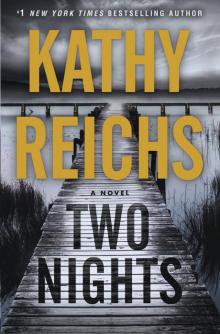 Two Nights
Two Nights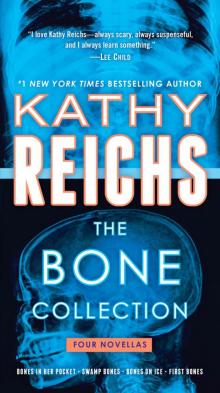 The Bone Collection: Four Novellas
The Bone Collection: Four Novellas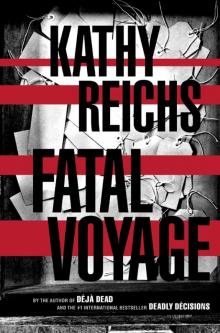 Fatal Voyage
Fatal Voyage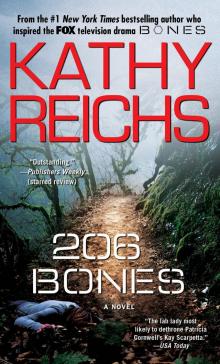 206 Bones
206 Bones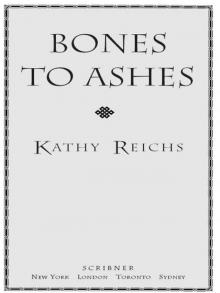 Bones to Ashes
Bones to Ashes Terminal
Terminal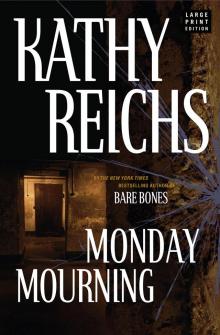 Monday Mourning
Monday Mourning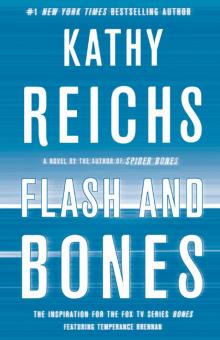 Flash and Bones
Flash and Bones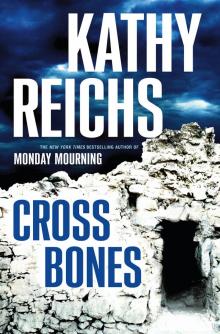 Cross Bones
Cross Bones Devil Bones
Devil Bones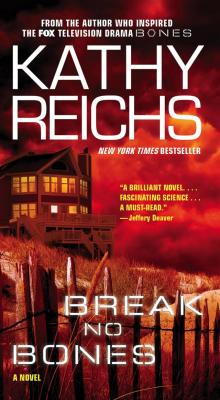 Break No Bones
Break No Bones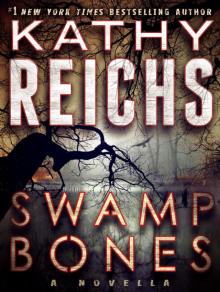 Swamp Bones
Swamp Bones Déjà Dead
Déjà Dead Shock
Shock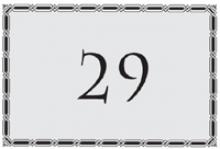 Spider Bones
Spider Bones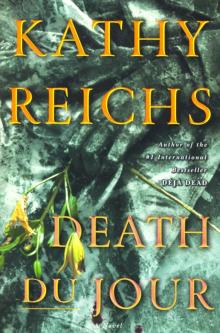 Death Du Jour
Death Du Jour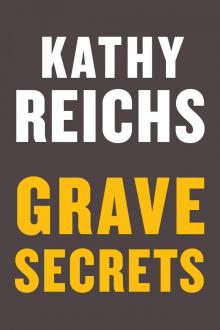 Grave Secrets
Grave Secrets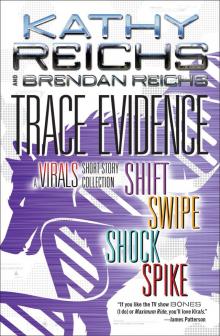 Trace Evidence: A Virals Short Story Collection
Trace Evidence: A Virals Short Story Collection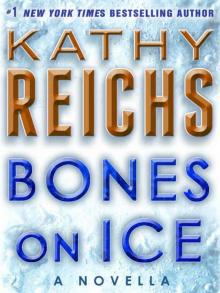 Bones on Ice
Bones on Ice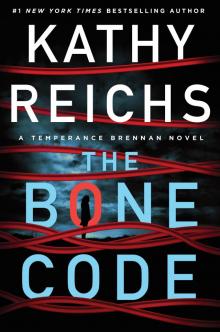 The Bone Code
The Bone Code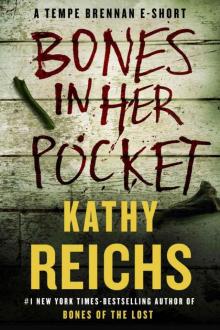 Bones in Her Pocket
Bones in Her Pocket Seizure:
Seizure: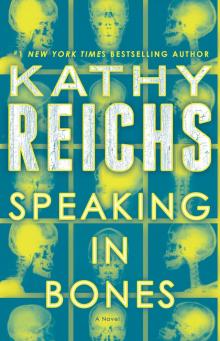 Speaking in Bones
Speaking in Bones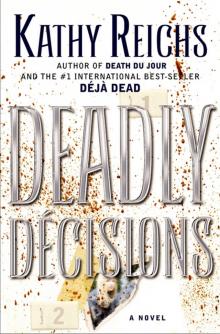 Deadly Decisions
Deadly Decisions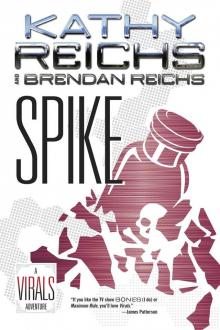 Spike
Spike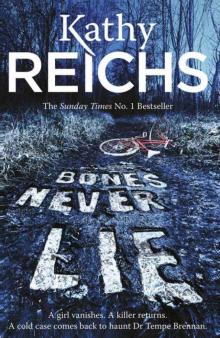 Bones Never Lie
Bones Never Lie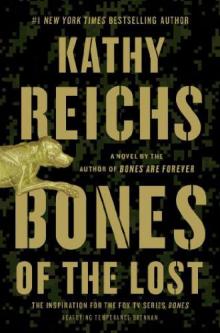 Bones of the Lost
Bones of the Lost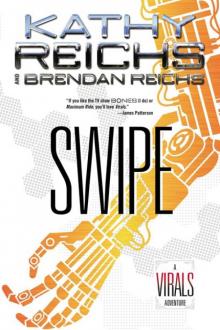 Virals 03.5 - Swipe
Virals 03.5 - Swipe Exposure
Exposure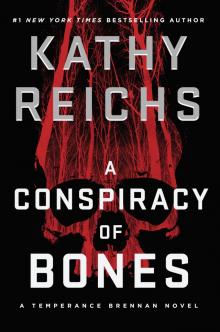 A Conspiracy of Bones
A Conspiracy of Bones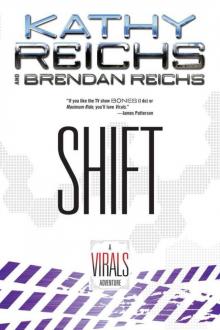 Shift (tory brennan)
Shift (tory brennan)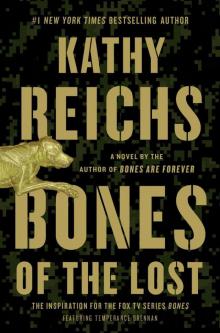 Bones of the Lost: A Temperance Brennan Novel tb-16
Bones of the Lost: A Temperance Brennan Novel tb-16 Virals tb-1
Virals tb-1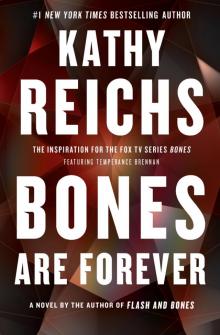 Bones Are Forever tb-15
Bones Are Forever tb-15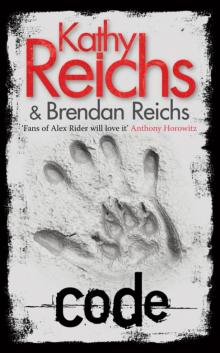 Code tb-3
Code tb-3 Seizure tb-2
Seizure tb-2 Deadly Descisions
Deadly Descisions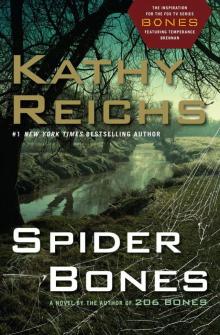 Spider Bones: A Novel
Spider Bones: A Novel